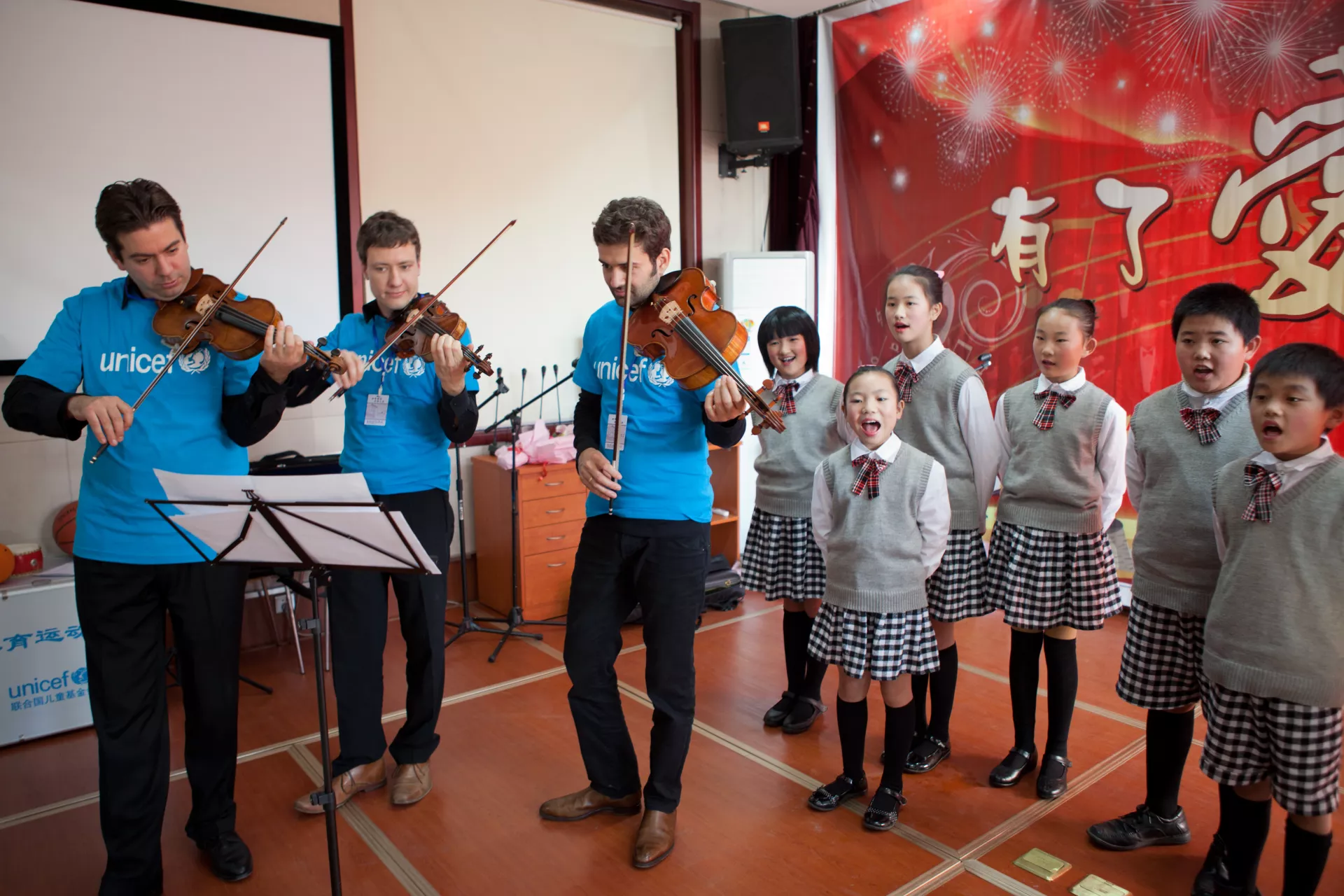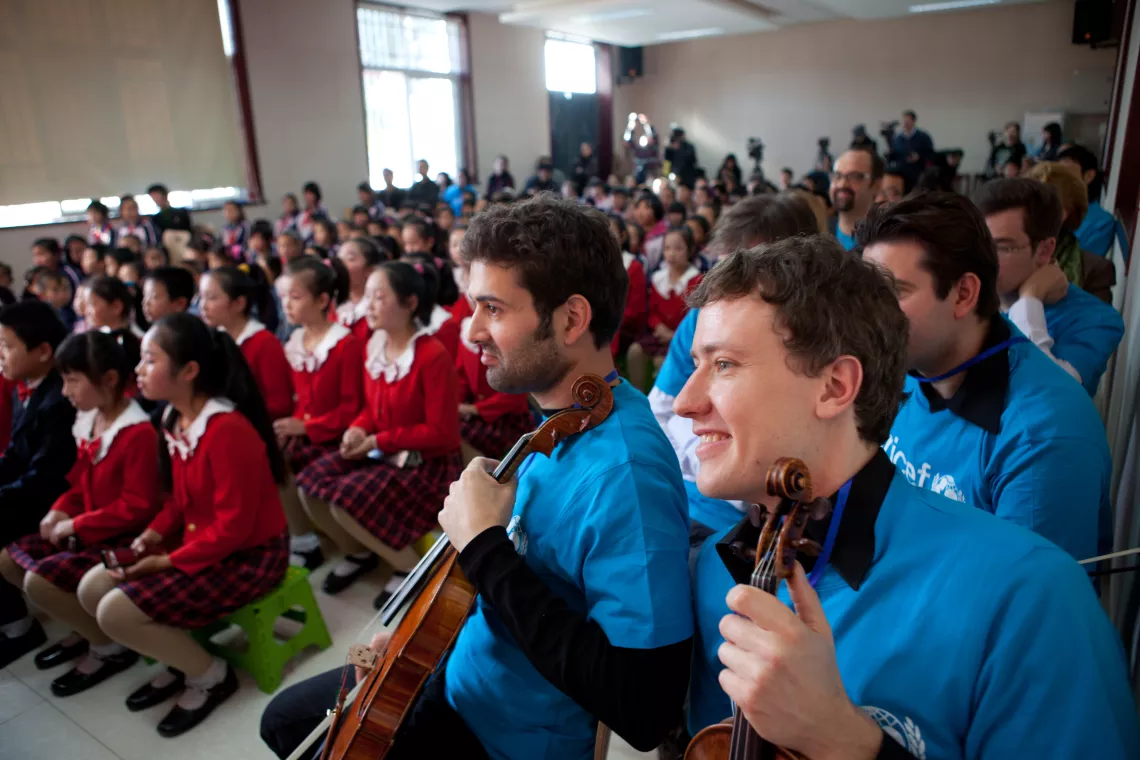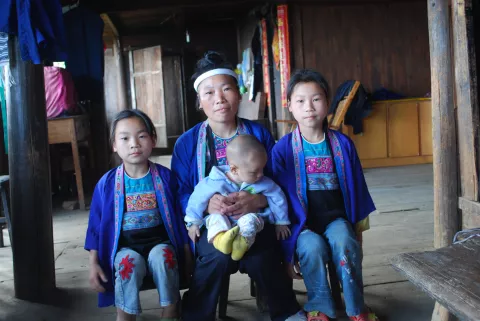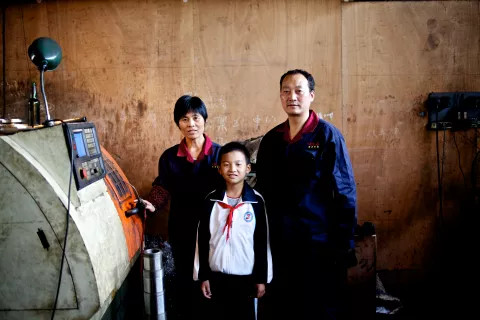"The children are so attentive; this is quieter than a concert hall"
Music for Beijing's Migrant Children

- Available in:
- 中文
- English
BEIJING, 14 November, 2011 – 12-year-old Chunchun, wants to be a professional musician when she grows up. Recently, she found an answer to a burning question – from a very unusual source.
"How long have you been practicing?" Chunchun asked a world class violist, following his recent performance in a primary school on the outskirts of Beijing.
"Well, I started at 7, I'm now 32, that makes 25 years," answered Micha Afkham of touring UNICEF Goodwill Ambassador, the Berliner Philharmoniker.
"Oh, that's why you played so beautifully, you've practiced 20 more years than I have." The girl exclaimed. Chunchun has played the harmonica since grade one in Zhongwu Primary School, famous for its unique enthusiasm for the harmonica. Chunchun is the child of migrant workers.
Nodding his head in agreement, Micha shook hands with Chunchun. The two musicians continued to discuss how they prepare to perform for an audience.
Chunchun is lucky that her school has been able to teach music to its mostly migrant pupils. Although basic education is now compulsory for all children in China, many urban centers that receive massive influx of rural migrant families struggle to provide access to quality education for all migrant children. Basic social services in China are provided in the place of one's birth.
"I know this is not a concert hall, and we are playing for 200 kids, so I expected they would make a lot of noise, but surprisingly, they are quiet and attentive – I am so touched." Micha said.
On November 9th, Berliner Philharmoniker visited Shangzhuang Zhongxin Primary School where 76% of the student body are migrant children. The visit marks the first time that the Berliner Philharmoniker has made a UNICEF field visit during a concert tour. UNICEF China hopes their visit will help highlight the challenges that China's migrant children face.
Chunchun is not typical of the audience that will enjoy the music of the Berliner Philharmoniker during their stay in Beijing. She would probably never be able to hear a world class orchestra in a concert hall like Beijing's National Center for the Performing Arts.
She migrated to Beijing with her parents 5 years ago. Like the other 27 million migrant children in China, Chunchun's access to essential services such as basic healthcare, education and social assistance is not assured. Due to lack of local "hukou" which is the official document proving that one is a legal resident of a locality, based on which basic social services are planned and provided by the local authorities, many migrant children go unaccounted for in the cities they call home.
"We are honoured to be here and play for you. You can learn from us and we can also learn from you." The General Manager of the orchestra Martin Hoffman told the children before the performance. Two hundred thrilled children from two predominantly migrant schools made up the audience.
"While great strides have been made in China to provide school access for 27 million migrant children, many municipalities struggle to provide even a basic education for these highly vulnerable and transient children," said Gillian Mellsop, UNICEF China Representative. "It's very important to remember that all children have the right to a quality education, with access to enriching extra-curricular activities in the arts and music. So we are just thrilled that our Berlin Philharmonic Goodwill Ambassador colleagues could share their music with these predominantly migrant schools."
Micha Afkham and his colleagues, Christophe Horak and Krzysztof Polonek, performed Antonin Dvorak's beautiful String Trio, during which the more than 200 hundred gathered children barely shifted in their seats. The artists then listened as the children's choir and harmonica band performed their music. As a finale, with no prior rehearsal, the Berliner Philharmoniker artists joined with child musicians to play three famous Chinese children's songs, filling the school's hall with an ocean of joyful sound.

UNICEF and migrant children
Since 2001 UNICEF has worked with National Working Committee on Women and Children (NWCCW) to assist municipal authorities to develop an improved registration system for migrant children as a basis for local governments to allocate resources to meet the needs of rapidly growing number of migrant children.
With improved registration, UNICEF has supported a variety of health, education and child protection interventions. By strengthening information and registration systems for migrant children and demonstrating good practices in providing basic services for marginalized urban populations, UNICEF is helping to make migrant children more visible to city planners.
The systems piloted by NWCCW with UNICEF support are now helping to improve delivery of basic services for migrant children in numerous urban centers in China.
"By enriching children's opportunities for artistic and creative expression in school in such a memorable way, even though it is just for one day, we are providing an opportunity to learn about music and art in a profound way. This could well be a once in a lifetime opportunity for the children involved." Gillian Mellsop, UNICEF China Representative concludes.



